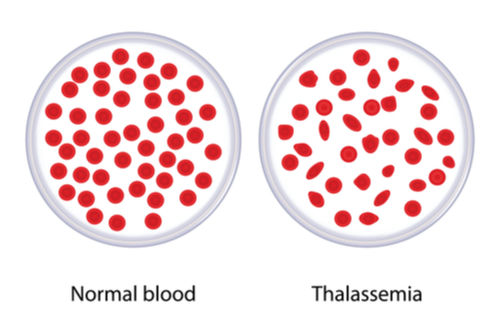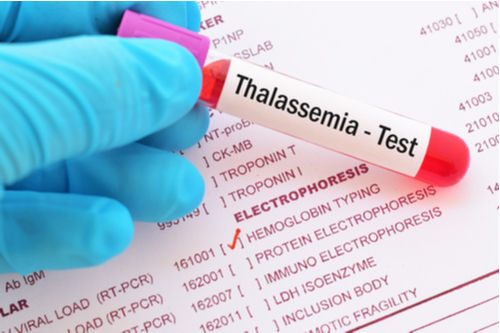General Health
Thalassemia: All You Need To Know About This Deadly Blood Disorder
4 min read
By By Apollo 24|7, Published on - - 06 May 2022, Updated on - 18 October 2022
Share this article
0
1 like

Who likes getting pricked by a needle? Probably, no one. However, there are some who have to undergo this ordeal every few weeks. People with thalassemia need regular blood transfusions in order to survive and lead a normal life. While the conditions affect millions of people, public awareness about it is abysmally low. The article explores some of the important facts about thalassemia in detail below.
What is Thalassemia?
Thalassemia is an inherited blood disorder that adversely affects the ability of the body to produce haemoglobin, a protein in red blood cells that carries oxygen. In thalassemia, the body either makes an abnormal form of haemoglobin or an inadequate amount of this protein. Low levels of haemoglobin in the blood make it difficult for the red blood cells to carry enough oxygen to different cells of the body.
Over time, the disorder causes the destruction of a large number of red blood cells, resulting in anaemia. Anaemic people may exhibit symptoms such as fatigue, shortness of breath, and chronic weakness. People with thalassemia have the risk of developing severe anaemia, which if not treated can lead to organ damage and even death.

What Causes Thalassemia?
Haemoglobin consists of two different types of proteins called alpha-globin and beta-globin. Thalassemia occurs when there is a defect in the genes that control the production of either of these proteins. Those lacking genes for alpha-globin develop alpha thalassemia, whereas the lack of beta-globin genes results in beta-thalassemia. Thalassemia is categorised into the following two types:
- Thalassemia major: It occurs when a person inherits the gene defect from both the parents. People with thalassemia major are at risk of developing severe symptoms.
- Thalassemia minor: It occurs when a person receives the gene defect from only one parent. While some people with this type may not have any symptoms, others may develop mild symptoms.

Symptoms
Not everyone with thalassemia exhibit symptoms. Depending on the type and severity of the condition, one may experience symptoms either at the time of birth, during the first two years, or later in childhood. Nevertheless, a person diagnosed with thalassemia may experience symptoms such as:
- Fatigue or tiredness
- Shortness of breath
- Weakness
- Dark urine
- Pale complexion
- Bone deformities
- Swelling in the abdomen
- Delayed physical growth and development
People with a minor form of alpha and beta-thalassemia may not exhibit any symptoms at all. Infants with beta-thalassemia major (Cooley anaemia) may appear normal at birth but develop severe anaemia during the first 12 months of life. Moreover, alpha thalassemia, the most severe form of thalassemia, may even result in stillbirth.
Can Thalassemia Be Treated?
People with mild thalassemia usually don’t require any treatment. However, those with moderate to severe thalassemia are treated with the help of:
- Recurring Blood Transfusion: People with severe thalassemia usually require blood transfusions every few weeks to keep healthy red blood cells in their system.
- Chelation Therapy: The procedure involves the removal of excess iron from the blood. Frequent blood transfusions can lead to the accumulation of iron in the blood. The iron buildup can damage the heart, liver, and various other vital organs.
- Stem Cell Transplant: Also known as bone marrow transplant, the procedure involves receiving stem cells from a compatible donor. Stem cell transplant can end the need for lifelong transfusions and medication to reduce iron overload.

Lifestyle Changes to Manage Thalassemia Better
Following your treatment plan and adopting healthy living habits can help manage thalassemia efficiently. Some of these lifestyle changes include:
- Avoid excess iron: People with thalassemia should limit their intake of iron-rich foods such as fish, meat, and fortified foods and beverages. A low-fat, plant-based diet is the ideal choice for most patients.
- Get the right nutrients: Thalassemia patients should get enough nutrients such as calcium, vitamin D, and folic acid to prevent deficiencies and improve the development of red blood cells.

- Exercise regularly: Moderate-intensity exercise such as walking, bicycling, swimming, and yoga can help improve overall health and prevent thalassemia symptoms from worsening. It is recommended to avoid heavy workouts as that can aggravate symptoms.
- Avoid infections: Thalassemia patients are prone to get infections, thus, they should get themselves vaccinated against Haemophilus influenza type b, hepatitis, meningococcal, and pneumococcal diseases. They should also wash their hands frequently and avoid close contact with sick people.
Thalassemia is a genetic condition, therefore it is not possible to prevent it completely. However, prenatal screening can help detect the condition in unborn babies. Lifestyle changes and timely treatment can help prevent the worsening of symptoms and improve the quality of life of thalassemia patients.
General Health
Leave Comment
Recommended for you

General Health
Pyrexia: Definition, Types, Causes, Symptoms, Diagnosis & Treatment
Explore Pyrexia: its definition, types, causes, symptoms, diagnosis, and treatment options to understand and manage fever effectively.

General Health
Allergy
Learn more about allergies, exploring their causes, symptoms, diagnosis, and management. Covering various types of allergies, including respiratory, food, skin, and drug allergies, this comprehensive guide explains the importance of recognizing severe allergic reactions like anaphylaxis. Discover chronic or severe symptoms to look out for and tips for coping with allergies, including minimizing exposure and staying informed about new treatments.

General Health
PPBS Test – Preparation, When To Take It, Uses, Purpose, Cost
Learn about the PPBS test: how to prepare, when to take it, its uses, purpose, and cost. Get the information you need for better healthcare decisions.
Subscribe
Sign up for our free Health Library Daily Newsletter
Get doctor-approved health tips, news, and more.
Visual Stories

Science-backed Home Remedies for Burns and Blisters
Tap to continue exploring
Recommended for you

General Health
Pyrexia: Definition, Types, Causes, Symptoms, Diagnosis & Treatment
Explore Pyrexia: its definition, types, causes, symptoms, diagnosis, and treatment options to understand and manage fever effectively.

General Health
Allergy
Learn more about allergies, exploring their causes, symptoms, diagnosis, and management. Covering various types of allergies, including respiratory, food, skin, and drug allergies, this comprehensive guide explains the importance of recognizing severe allergic reactions like anaphylaxis. Discover chronic or severe symptoms to look out for and tips for coping with allergies, including minimizing exposure and staying informed about new treatments.

General Health
PPBS Test – Preparation, When To Take It, Uses, Purpose, Cost
Learn about the PPBS test: how to prepare, when to take it, its uses, purpose, and cost. Get the information you need for better healthcare decisions.